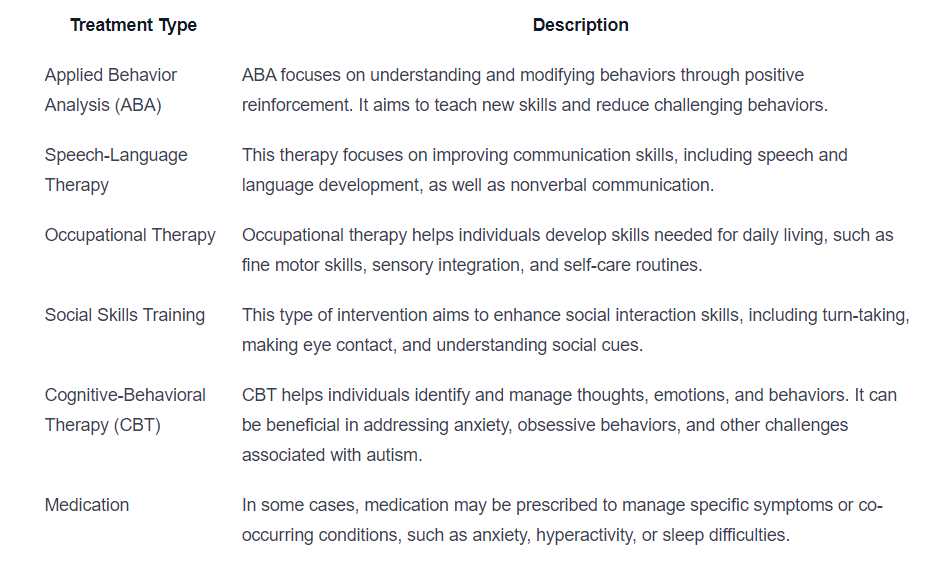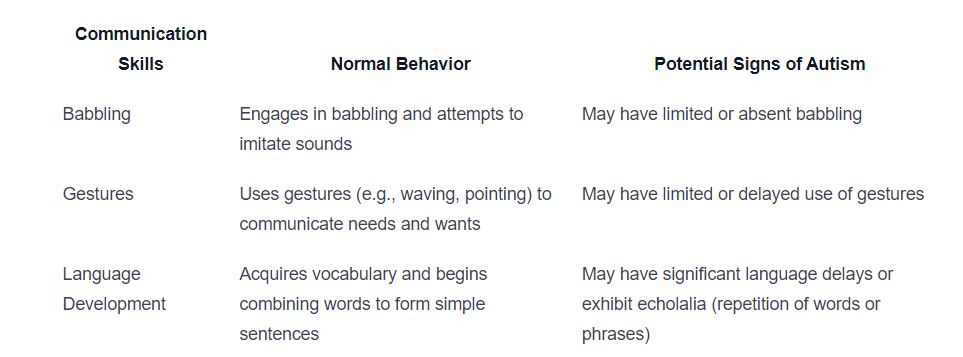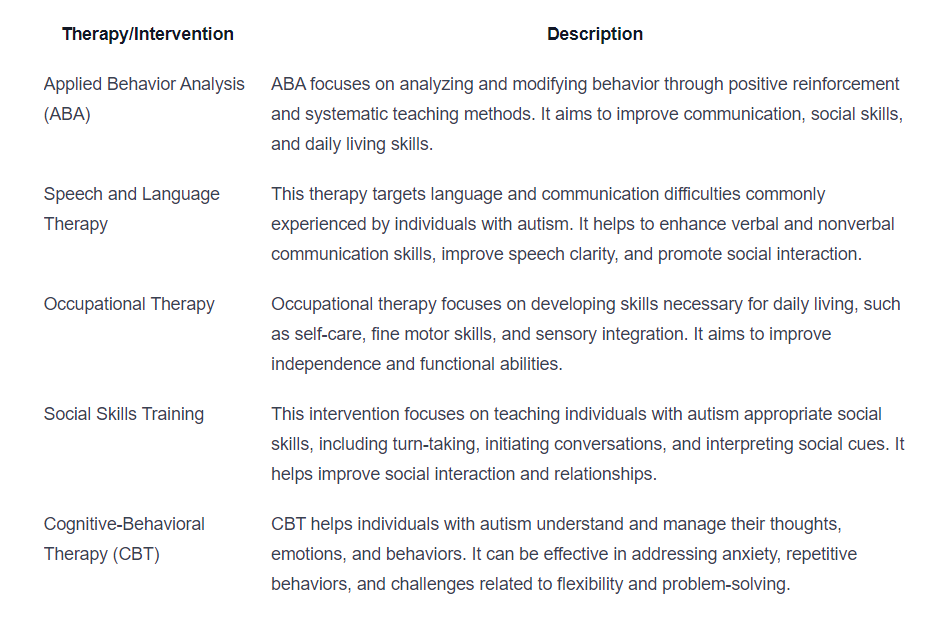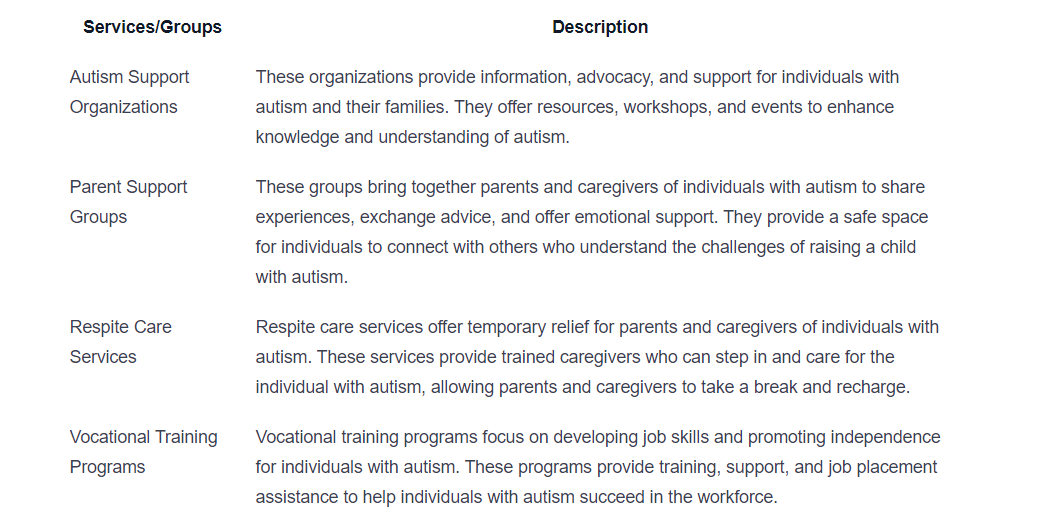What Happens If Autism is not Treated?
Don't ignore autism treatment! Discover the unseen battle and the detrimental effects of neglecting intervention.

Understanding Autism Treatment
When it comes to autism, early intervention and appropriate treatment play a crucial role in helping individuals with autism spectrum disorder (ASD) reach their full potential. Understanding the importance of early intervention and the different types of treatments available is essential in providing the necessary support for individuals with autism.
Importance of Early Intervention
Early intervention refers to the timely identification and initiation of treatments and therapies for children with autism. It is widely recognized that early intervention can significantly improve outcomes for individuals with ASD. By starting treatment as early as possible, it becomes possible to address the specific challenges and needs of the child, promoting their development and enhancing their quality of life.
Research has shown that early intervention can lead to significant improvements in areas such as communication, social skills, behavior, and cognitive abilities. It can also help to minimize the impact of certain challenges associated with autism, such as sensory sensitivities and repetitive behaviors.
Types of Treatments Available
There are various types of treatments available for individuals with autism, and the choice of treatment may depend on several factors, including the individual's age, severity of symptoms, and specific needs. Here are some common types of treatments used in autism intervention:

It's important to note that treatment plans are highly individualized, and a combination of these treatments may be recommended based on the unique needs of each individual with autism. Regular evaluation and adjustment of treatment strategies are essential to ensure that the interventions continue to benefit the individual throughout their developmental journey.
Understanding the importance of early intervention and the available treatment options is the first step in providing the necessary support for individuals with autism. By taking a proactive approach and seeking appropriate treatment, individuals with autism can have better opportunities for growth, development, and improved overall well-being.
Impact of Ignoring Autism Treatment
When autism treatment is ignored or delayed, it can have significant consequences on individuals with autism spectrum disorder (ASD). It is crucial to understand and address these impacts to provide the best possible support for individuals with autism. Here are three key areas where ignoring autism treatment can have detrimental effects:
Social and Communication Challenges
One of the primary characteristics of autism is difficulties in social interaction and communication. Without appropriate treatment and interventions, individuals with autism may struggle to develop and maintain meaningful relationships. They may find it challenging to understand social cues, engage in reciprocal conversations, and establish connections with peers and family members.

Behavioral Issues
Untreated autism can also lead to challenging behaviors that can significantly impact daily functioning. Many individuals with autism may exhibit repetitive behaviors, sensory sensitivities, and difficulties with self-regulation. Without appropriate interventions, these behaviors can become more pronounced and interfere with daily activities and routines.

Academic and Developmental Delays
Without early intervention and targeted therapies, individuals with autism may experience delays in their academic and developmental progress. Difficulties in areas such as speech and language, cognitive skills, and motor skills can hinder their ability to learn and reach their full potential.

Understanding the impact of ignoring autism treatment highlights the importance of early intervention and ongoing support for individuals with ASD. By addressing social and communication challenges, behavioral issues, and developmental delays, it becomes possible to provide targeted interventions and create an environment that promotes growth and development for individuals with autism.
Long-Term Consequences
Ignoring autism treatment can have significant long-term consequences for individuals with autism spectrum disorder (ASD). Without proper intervention and support, challenges in adulthood can arise, affecting independence and overall quality of life.
Challenges in Adulthood
When autism treatment is not provided or neglected, individuals with ASD may face a range of challenges in adulthood. These challenges can manifest in various aspects of life, including education, employment, relationships, and daily living skills.Challenges in Adulthood
Difficulties in finding and maintaining employment
Limited educational opportunities and lower academic achievements
Social and communication difficulties
Reduced access to essential services and resources
Higher rates of mental health issues, such as anxiety and depression
These challenges can significantly impact an individual's ability to lead a fulfilling and independent life. It is crucial to recognize that early intervention and ongoing treatment play a crucial role in mitigating these challenges and promoting positive outcomes.
Impact on Independence and Quality of Life
The absence of proper autism treatment can have a profound impact on an individual's independence and overall quality of life. Without appropriate interventions and support, individuals with ASD may experience limitations in various areas, including:
- Daily Living Skills: Autism treatment helps individuals develop essential life skills, such as personal hygiene, self-care, and household management. Ignoring treatment can impede the acquisition of these skills, making it challenging to live independently.
- Social Relationships: Social interaction and communication difficulties are common in individuals with ASD. Without proper treatment, these challenges can persist into adulthood, affecting the ability to form and maintain meaningful relationships with family, friends, and romantic partners.
- Employment Opportunities: Lack of early intervention and appropriate therapies can hinder the development of necessary skills for employment. This can lead to limited job prospects, lower income potential, and a higher likelihood of unemployment or underemployment.
- Health and Well-being: Neglecting autism treatment can contribute to increased stress levels, mental health issues, and reduced overall well-being. Proper treatment, on the other hand, can equip individuals with coping strategies, stress management techniques, and support systems to enhance their overall health and quality of life.
It is essential to prioritize autism treatment to address these long-term consequences. With early intervention and ongoing support, individuals with ASD can develop important skills, improve their independence, and lead fulfilling lives.
Remember, seeking professional help, creating a supportive environment, and accessing available resources are fundamental steps in ensuring the best possible outcomes for individuals with autism spectrum disorder.
Support and Resources
When it comes to autism treatment, there are various support and resources available to individuals and families affected by autism. These resources aim to provide assistance, guidance, and interventions to help individuals with autism reach their full potential. Two key areas of support are therapies and interventions, as well as community services and support groups.
Therapies and Interventions
Therapies and interventions play a crucial role in the treatment of autism. These approaches are designed to address specific challenges and promote the development of essential skills. Here are some common therapies and interventions used in autism treatment:

It's important to note that the specific therapies and interventions recommended for each individual may vary based on their unique needs and circumstances. Working closely with healthcare professionals and therapists can help determine the most suitable approach for autism treatment.
Community Services and Support Groups
Community services and support groups provide a valuable network of assistance and understanding for individuals and families affected by autism. These resources offer a sense of community, guidance, and access to additional support. Here are some examples of community services and support groups for autism:

By utilizing these support services and resources, individuals with autism and their families can access the necessary tools, information, and assistance to navigate the challenges associated with autism. It's important to explore and take advantage of the available support to promote the well-being and development of individuals with autism.
Advocating for Autism Treatment
Recognizing the importance of autism treatment and early intervention, advocating for individuals with autism is crucial. By breaking stigmas and promoting awareness and acceptance, we can create a more inclusive society that supports the well-being and development of individuals on the autism spectrum.
Breaking Stigmas
One of the key aspects of advocating for autism treatment is challenging and breaking the stigmas surrounding autism. Stigmas often lead to misconceptions, stereotypes, and discrimination, which can hinder access to treatment and support for individuals with autism.
By educating the public about autism and debunking common misconceptions, we can help foster a more understanding and accepting environment. It is important to emphasize that autism is a neurodevelopmental disorder and not a choice or a result of poor parenting. By spreading accurate information and sharing personal stories, we can dispel myths and promote empathy and compassion.
Promoting Awareness and Acceptance
Another crucial aspect of advocacy is promoting awareness and acceptance of autism within society. This involves raising public consciousness about the diverse strengths, abilities, and challenges of individuals on the autism spectrum.
Promoting awareness can be done through various means, such as community events, workshops, and educational campaigns. These initiatives can help educate the public about the importance of early intervention, the benefits of treatment, and the unique perspectives of individuals with autism.
By fostering acceptance, we strive to create an inclusive society that respects and values individuals with autism. This includes advocating for equal opportunities in education, employment, and social settings. Acceptance involves embracing neurodiversity and recognizing that every individual, regardless of their neurological differences, has the right to be treated with dignity and respect.
Advocating for autism treatment is a collective effort that involves individuals, families, communities, and organizations. By breaking stigmas, promoting awareness, and fostering acceptance, we can create a more supportive and inclusive society that empowers individuals with autism to thrive and reach their full potential.
Moving Forward
When it comes to autism, taking proactive steps is essential for the well-being and development of individuals on the spectrum. Moving forward involves seeking professional help and creating a supportive environment that fosters growth and acceptance.
Seeking Professional Help
One of the most crucial steps in addressing autism is seeking professional help. Autism treatment typically involves a multidisciplinary approach, with various specialists working together to create an individualized plan. Here are some professionals who may be involved in the treatment process:

By consulting these professionals, individuals with autism can access appropriate interventions and therapies that target their specific needs. Early intervention is especially crucial, as it can significantly improve long-term outcomes.
Creating a Supportive Environment
In addition to seeking professional help, creating a supportive environment is vital for individuals with autism. Here are some strategies to consider:
- Education and Awareness: Promote understanding and acceptance of autism within the family, school, and community. Educate others about the unique strengths and challenges of individuals on the spectrum.
- Structured Routine: Establish a predictable daily routine, as individuals with autism often thrive in structured environments. Consistency and clear expectations can help reduce anxiety and promote a sense of security.
- Visual Supports: Use visual supports such as schedules, charts, and visual aids to enhance communication and comprehension. Visual cues can assist individuals with autism in understanding and following routines or instructions.
- Sensory Considerations: Recognize and accommodate sensory sensitivities. Create a sensory-friendly environment by minimizing noise, providing quiet spaces, and considering the individual's sensory preferences.
- Social Opportunities: Encourage social interactions and provide opportunities for social skill development. This can include participation in structured activities, joining social groups, or engaging in therapies that focus on social interaction.
Remember, every individual with autism is unique, and what works for one person may not work for another. It's important to tailor the support and environment to meet the specific needs of the individual.
By seeking professional help and creating a supportive environment, individuals with autism can thrive and reach their full potential. With early intervention and the right support systems in place, the challenges faced by individuals on the spectrum can be effectively addressed, leading to improved outcomes and a better quality of life.
Sources
https://www.abtaba.com/blog/autism-goes-untreated
https://www.crossrivertherapy.com/autism/what-happens-if-autism-is-not-treated
https://www.bridgecareaba.com/blog/what-happens-if-autism-is-not-treated
Similar articles
We’re here to help you

Our team is here to assist you in this process. Contact us for any assistance.
it’s easy to apply
We Accept Most Insurances
Our in-network insurance partnerships make ABA therapy more accessible to families throughout our service areas.







Our Insurance Process
We'll request your insurance details to help us verify your plan's coverage for ABA therapy. Once we've received this information, we'll walk you through your benefits, including copayments, deductibles and out-of-pocket maximums, so you know what to expect in advance.
Our team will then handle the preauthorization and all the necessary paperwork.
.svg)





















.jpeg)


































.jpeg)




.jpeg)







.jpeg)











.jpeg)
















